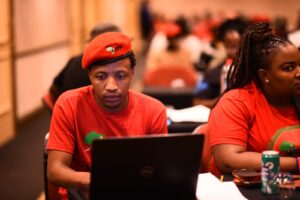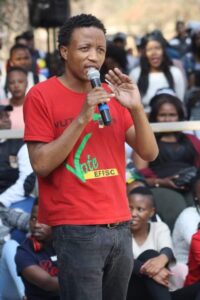An incident involving a thirteen-year-old girl child at the Crowthorne Christian Academy in South Africa led to the schools’ closure and the re-sparking of debate on black aesthetics in a racially polarized country that still battles with systemic, systematic, and institutional discrimination against blacks, who make up the majority of the population.
Tynil Gcabashe, a thirteen-year-old student, had her dreadlocks on when the school made the racist decision to dismiss her from class, according to a media release from the Economic Freedom Fighters Provincial Communications Officer for Gauteng province, Dumisani Baleni.
This provoked the EFF to stage a picket at the school.
“The school principal is reported to have said the learner will not be allowed back to school unless her dreadlocks are shaved off, on the 14 August when the learner’s parents sought to resolve the issue with the school, a white racist male alleged to be the principal’s husband, acting on the instruction and permission of the school, violently handled both the mother and the young girl and pushed them out of the school. A video circulating on social media bears evidence to this effect,” the statement reads.
Baleni further said the Crowthorne Christian Academy has a policy that allows only learners with natural hair in the school.
“This policy is predicated on the racist notion that natural hair means relaxed and straightened hair inherent to white people, whereas curly hair and dreadlocks, characteristic of black people’s hair, are considered unnatural and therefore prohibited from the school,” Baleni stated.
Hendrick Makaneta, education activist and deputy chairperson of the Foundation for Education and Social Justice Africa, told Ubuntu Times that black aesthetics are not accepted as a universal standard because of the highly entrenched European culture in private schools. He said blacks are expected to accede to policies that were formulated by whites and that such policies do not acknowledge African hair, such as dreadlocks.

“Unfortunately, the thirteen-year-old girl was victimized for expressing her African identity,” Makaneta said.
“The fact that the school was allowed to develop policies that are not in line with the spirit of the constitution of the republic (South Africa) exposed the government’s failure to provide leadership,” he added.
Makaneta highlighted that although the autonomy of educational institutions to develop their own policies should be respected, the government ought to put correct mechanisms in place to monitor and evaluate the various policies adopted by the institutions from time to time.
The events that unfolded led to the closure of the school, which was found not to have the proper licenses to operate.
Spokesperson at the Gauteng Education Department, Steve Mabona, told Ubuntu Times that the incident with the thirteen-year-old is an isolated case of discrimination, and the department hardly hears of or deals with such cases.
“All codes of conduct of our schools were reviewed not to discriminate learners on the basis of hair… What is paramount is discipline of learners at our schools,” Mabona told Ubuntu Times.
Mabona said the school has now been closed down due to non-compliance with registration as an educational institute.
“The school was operating illegally because they decided to relocate and changed their name without following proper procedures,” Mabona stated in email responses to Ubuntu Times.
Education activist Makatena said racism is pervasive in South Africa as a result of the economic disparities between white and black South Africans, with the former still being largely in control of the economy.

“The fact that the economy is still controlled largely by the white minority means that acts of racism will continue,” he said.
“Of course not every white person is racist, but all whites in South Africa are beneficiaries of racism,” he further highlighted.
Makatena implored the government of South Africa to take practical steps to end poverty and inequality, which affects mainly black South Africans in a negative way.
“As long as the owners of the means of production remain white, we are likely to see a continuation of racism. Even the schools we are talking about now are owned by whites; hence, black children are expected to comply with European norms and standards,” he said.
“Government must also move swiftly to decolonize education by making history compulsory in all schools; children need to learn more about African history as opposed to European history,” he added.
Gauteng is the economic hub of South Africa and Southern Africa and is home to the richest square mile on the African continent, Sandton.
There are over 2200 public schools in Gauteng and 500 private schools.
Although Ubuntu could not independently verify the figures, Gauteng is estimated to have about 2.6 million learners. Twenty-one percent of South Africa’s total estimated learner population of 15 million.

